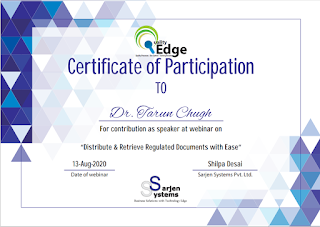Why training is essential part in Pharmaceutical Industry and steps to
deal with it
Training is one of the
essential elements of the Pharmaceutical and Biotechnology Industry as it gives
perfection in the skill of the employee to understand the process and to help
in investigation of any issue occurring.
For example, if the weight variation
is occurring in the running machine, only understanding and the skill of the
operator can resolve the issue on the spot. This can happen only when the
operator for a supervisor has good training about the subject. Furthermore, inadequate training contributes to process
and product variability.
CFR 211.25 Personnel qualifications says “Each person engaged in the manufacture, processing, packing, or holding of a drug product shall have education, training, and experience, or any combination thereof, to enable that person to perform the assigned functions”. Therefore, putting any person on a job in the pharmaceutical or biotechnological industry, it is necessary to have his or her complete training and evaluation about his job responsibilities. Life science companies that embrace and implement a quality culture ensure employees are optimally trained before touching the product, therefore safeguarding and protecting the health and well-being of the general public.
To accomplish this, an integrated quality/human resources
(HR) systems approach is recommended for the development and deployment of
training. The training should be implemented in pre-defined SOPs and
Evaluations. To develop an effective training program the following steps
should be followed.
- Identify needs – engaging management and staff
To
develop any training program, it is essential to understand the requirement of
a person coming for a job or responsibility by management or supervisor to take
care for making the process or subject clear and the people can do their job
with proper understanding and skill.
- Identify Subject Matter Experts (SMEs)
SMEs
are the experts for the subject responsible for giving complete training and
understanding of the job and responsibilities. They are also responsible for
designing training programs and evaluating the protocols. To keep an eye on the
training programs happening, which are in-line to the business requirements.
Therefore, they are effective in performing technical and skills training,
sharing knowledge and information, and transferring learning.
- Preparing a steering committee for action
Group
of cross-functional department team, where each one has expertise in their own
field forms a steering committee. The committee should be knowledgeable of the
strategic implications of the training and its related outcomes.
- What is current state assessment
Responsibility
of the steering committee is used to evaluate what is the current situation of
training in the unit. Routine they have to evaluate the skill, the program
Evaluation of people working on the shop floor.
- Identify strengths and gaps
In routine or in
case of any issue, management and subject matter experts have to identify the
gaps by doing investigation. During the investigation they have to find out the
strength and weakness of the system and appropriate CAPA (Corrective and preventive
action) is required to fulfill non-occurrence of the issues.
6.
Training module development team formation
On
the basis of Investigation and CAPA requirement, the subject expert has to
prepare a module depending
on the gaps identified for the weakness found in the
system.
- Module development
Important is to identify the training support material or
resources required to reinforce each module for example SOP basic concepts etc.
Selection of staff should be done on the basis of their skill in the subject or
process. As per Training Need Identification (TNID) matrix, module training
should be given to the people.
- Pilot study of module
Each module should be evaluated for its clarity, accuracy
and performance requirement. To conduct a pilot study, trainers should be
certified for the revaluation.
- Feedback and review for
finalization of module
Before going to the finalization of the module,
evaluation and assessment of pilot protocol should be taken from the
supervisors for experts. The further requirements of the module and training of
the changes should be given to the user.
- Finalize the modules and
conclusion
Once the pilot module is completed the final approved
module should be published for the activity and training should be imparted.
Effectiveness
of the training imparted is must and should have periodic evaluation to
understand the people have understood the module requirement and following SOPs
instructions as per changes occurred and no further issue occur in future due
to previous deviations or CAPA taken.
Further any query can be put into comment section or write to author at simcopharma5@gmail.com








